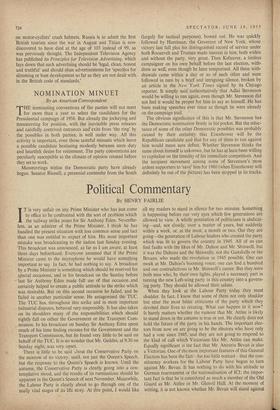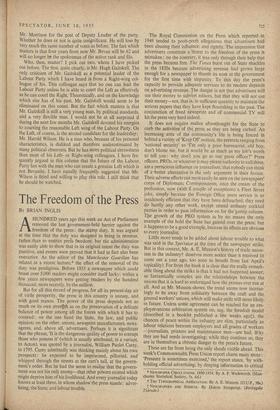Political Commentary
BY HENRY FAIRLIE IT is very unfair on any Prime Minister who has just come to office to be confronted with the sort of problem which the railway strike poses for Sir Anthony Eden. Neverthe- less, as an admirer of the Prime Minister, I think he has handled the present situation with less common sense and tact than one was entitled to expect of him. His most important mistake was broadcasting to the nation last Sunday evening. This broadcast was announced, as far as I am aware, at leasf three days beforehand. Everyone assumed that if the Prime Minister came to the microphone he would have something important to say. In fact, he had nothing to say. A broadcast by a Prime Minister is something which should be reserved for special occasions, and in his broadcast on the Sunday before last Sir Anthony Eden made full use of that occasion ,and certainly helped to create a public attitude to the strike which was desirable. But on this second occasion he failed, and he failed in another particular sense. He antagonised the TUC. The TUC has, throughout this strike and in most important industrial disputes. behaved very responsibly. It has also taken on its shoulders many of the responsibilities which should rightly fall on either the Government or the Transport Corn- / mission. In his broadcast on Sunday Sir Anthony Eden spent much of his time finding excuses for the Government and the Transport Commission, but he found very little to be said on behalf of the TUC. It is no wonder that Mr. Geddes, at 9.30 on Sunday night, was very upset.
There is little to be said about the Conservative Party on the morrow of its victory, until, not just the Queen's Speech, but the response to the Queen's Speech is known. Until the autumn, the Conservative Party is clearly going into a con- templative mood, and the results of its ruminations should be apparent in the Queen's Speech of next November. Meanwhile, the Labour Party is clearly about to go through one of the really vital stages of its life story. At this point, I would like all my readers to stand in silence for two minutes. Something is happening before our very eyes which few generations are allowed to view. A whole generation of politicians is abdicat- ing—and, not slowly, over a matter of years, but suddenly within a week, or, at the most, a month or two. Out they are going—the generation of Labour leaders who created the party which was fit to govern the country in 1945. All of us can find faults with the likes of Mr. Dalton and Mr. Shinwell, but it was the Daltons and the Shinwells, not the Gaitskells or the Bevans, who made the revolution in 1945 possible. One can mock at Mr. Dalton's booming voice: one can find a hundred and one contradictions in Mr. Shinwell's career. But they were both men who, by their own lights, played a necessary part in turning the new Left-wing party in this country into a govern- ing party. They should be allowed their salute.
When they look at the Labour Party today they must shudder. In fact, I know that some of them not only shudder but utter the most bitter criticisms of the party which they devoted their lives to creating. What can happen to it now? It barely matters whether the rumour that Mr. Attlee is likely to stand down in the autumn is true or not. He clearly does not hold the future of the party in his hands. The important elec- tors from now on are going to be the electors who have only had a vote since 1945, and they are not going to respond to the kind of call which Victorians like Mr. Attlee can make. Equally significant is the fact that Mr. Aneurin Bevan is also a Victorian. One of the most important features of this General Election has been the facv—far too little noticed—that the con- stituency workers for the Labour Party have begun to turn against Mr. Bevan. It has nothing to do with his attitude to German rearmament or the nationalisation of ICI; the impor- tant fact is that he is considered as much a member of the Old Guard as Mr. Attlee or Mr. Glenvil Hall. At the moment of writing, it is not known whether Mr. Bevan will stand against Mr. Morrison for the post of Deputy Leader of the party. Whether he does or not is quite insignificant. He will lose by very much the same number of votes as before. The fact which matters is that four years from now Mr. Bevan will be 62 and Will no longer be the spokesman of the active rank and file.
Who, then, matter? I pick out two. whom I have picked out before. The first, quite clearly, is Mr. Hugh Gaitskell. The only criticism of Mr. Gaitskell as a potential leader of the Labour Party which I have heard is from a Right-wing col- league of his. This colleague .says that no one can lead the Labour Party unless he is able to court the Left as effectively as he can court the Right. Theoretically, and on the knowledge which one has of his past, Mr. Gaitskell would seem to be eliminated on this count. But the fact which matters is that Mr. Gaitskell is still a very young man, by political standards, and a very flexible man. I would not be at all surprised if during the next few months Mr. Gaitskell devoted his energies to courting the reasonable Left wing of the Labour Party. On the Left, of course, is the second candidate for the leadership : Mr. Harold Wilson. He is a man who. because of his personal characteristics, is disliked and therefore underestimated by many political observers. But he has more political shrewdness than most of his Left- or Right-wing colleagues. I have fre- quently argued in this column that the future of the Labour. Party lies with the man who can create a genuine Left which is not Bevanite. I have equally frequently suggested that .Mr. Wilson is fitted and willing to play this role. I still think that he should be watched.











































 Previous page
Previous page